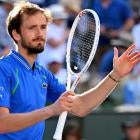
Naomi Osaka will not play in this year's French Open.
After winning her fourth Grand Slam title at this year's Australian Open, Osaka announced her withdrawal from the second Grand Slam of the season on Monday. In a statement shared on social media, Osaka explained that she would be skipping the clay-court tournament to protect her mental well-being.
— NaomiOsaka大坂なおみ (@naomiosaka) May 31, 2021
"I think now the best thing for the tournament, the other players and my well-being is that I withdraw so that everyone can get back to focusing on the tennis going on in Paris," Osaka said in the statement.
"I never wanted to be a distraction and I accept that my timing was not ideal and my message could have been clearer. More importantly I would never trivialize mental health or use the term lightly. The truth is that I have suffered long bouts of depression since the US Open in 2018 and I have had a really hard time coping with that."
Osaka's referring to the dramatic and controversial 2018 US Open final against Serena Williams, a match in which Williams received three code violations, including a game penalty, in the final set. Osaka went on to defeat Williams, 6-2, 6-4, to win her first career slam title.
Ahead of the French Open, Osaka announced her pledge to skip post-match press conferences to protect her mental health. After her first-round match win against Patricia Maria Tig on Sunday, Osaka stood by her word and was handed a fine for her actions.
Osaka, the world's No. 2 ranked player, was fined $15,000 for not participating in a mandatory post-match press conference. In a joint statement, all four Grand Slam organizers threatened expulsion from the tournament and future Grand Slams if she continued to not speak to the media.
"We have advised Naomi Osaka that should she continue to ignore her media obligations during the tournament, she would be exposing herself to possible further Code of Conduct infringement consequences," the four Grand Slam tournaments said Sunday in a joint statement.
"As might be expected, repeat violations attract tougher sanctions including default from the tournament (Code of Conduct article III T.) and the trigger of a major offence investigation that could lead to more substantial fines and future Grand Slam suspensions (Code of Conduct article IV A.3.)."
Following Osaka's withdrawal announcement, Gilles Moretton, the French Tennis Federation President, issued a statement:
First and foremost, we are sorry and sad for Naomi Osaka. The outcome of Naomi withdrawing from Roland-Garros is unfortunate. We wish her the best and the quickest possible recovery, and we look forward to having Naomi at our Tournament next year. As all the Grand Slams, the WTA, the ATP and the ITF, we remain very committed to all athletes' well-being and to continually improving every aspect of players' experience in our Tournament, including with the Media, like we have always strived to do.
In her statement, Osaka said she planned to "take some time away from the court," though she did not specify for how long. The next Grand Slam tournament this season will be Wimbledon in London, set to begin two weeks after the French Open concludes, on June 28.
Tennis, notable for its lone nature, is no stranger to mental health concerns on tour. The sport itself -- with singles competition, in particular -- rewards players for self-reliance and grit. But, several former professional tennis players have shared their mental health stories. Former World No. 6 Cliff Richey and former World No. 1 and three-time Grand Slam champion Jennifer Capriati among them.
Richey, who reached the US Open and French Open semifinals, spoke about his battles with clinical depression. "I've never tied a match yet. You either win or you lose. You're high or low," Richey told ESPN in 2015. Richey spoke about his struggles further in 2010 when he published his memoir, "Acing Depression: A Tennis Champion's Toughest Match."
Capriati -- who at 15-years-old became the youngest ever to reach a Grand Slam semifinal at Wimbledon in 1991 -- battled anxiety and depression during and after her pro career, which was cut short due to injuries. Following an arrest on a misdemeanor charge of marijuana possession, at the age of 18, Capriati voluntarily entered a drug and alcohol rehabilitation center. After she returned to tennis, the then-23-year-old Capriati made a plea during a 1999 US Open press conference with the media, begging them to keep their questions focused on the present instead of the mistakes from her past.
Osaka's no-media decision and the subsequent fall-out that led to her withdrawal could be a moment worthy of reflection in the tennis community, to help the sport lead a destigmatized discussion of mental health in sports, and mental health altogether.
Osaka has not made it past the third round at the French Open in her three career appearances. Last year, she was forced to withdraw because of a nagging hamstring injury. In 2019, Osaka lost to Karolína Plíšková and in 2018, she lost to Madison Keys. Both matches were straight-set losses.





















